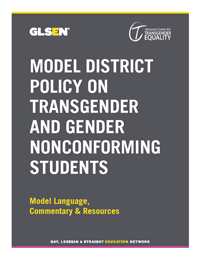New Resource: GLSEN and NCTE Model District Policy on Transgender and Gender Nonconforming Students

NCTE and our friends at the Gay, Lesbian & Straight Education Network (GLSEN) today released a model district policy that outlines best practices for school districts across the country to ensure that all students are safe, included and respected in school, regardless of their gender identity You may have seen the noticias recientes of two transgender high school students in Colorado who were suspended for using restrooms that corresponded with their gender identity. Their experience is not unique. Startling numbers of transgender students across the country experience harassment and lack of support from school administrators, teachers, and other students.or expression. According to data from GLSEN’s Harsh Realities: The Experiences of Transgender Youth in Our Nation’s Schools, two-thirds of transgender students felt unsafe in school because of their sexual orientation (69%) and how they expressed their gender (65%). Almost all transgender students were verbally harassed, and more than half were physically harassed. Experiences like these significantly hurt students’ ability to succeed in school. Transgender students who experienced high levels of harassment had significantly lower GPAs, were more likely to miss school due to safety concerns, and were more likely to report that they were not planning on going to college, than those who experienced lower levels of harassment. Even more devastating, data from the Encuesta Nacional de Discriminación Transgénero conducted by NCTE and the National Gay and Lesbian Task Force revealed that 51% of transgender people who were harassed or bullied in school reported attempting suicide. To address these problems, it is critical for school districts to incorporate policies that promote safety, privacy, and full inclusion for transgender and gender non-conforming students. The model policy we released today with GLSEN is designed to be adaptable to fit the needs of individual school districts and is flexible enough to allow districts to comply with state and local laws. The model policy covers key issues faced by transgender and gender-nonconforming students, including:
- Intimidación, acoso y discriminación.
- Privacidad y confidencialidad
- Documentation (e.g., school records)
- nombres y pronombres
- Equal access to gender-segregated activities and areas
- Códigos de vestimenta
- Formación y desarrollo profesional.
“We’re so proud to work with GLSEN on this policy,” said NCTE Executive Director Mara Keisling. “Transgender youth are everywhere, and schools are beginning to understand that providing for their safe and fair treatment is not a burden, but a core part of the educational mission. Schools are increasingly attuned to providing a safe and supportive environment for a diverse school community, and gender diversity has to be part of that picture. This groundbreaking model policy is here to help schools find the right solutions to support and educate all students.” We hope state and local activists will use this model policy to urge school districts to improve their policies in a way that offers transgender and nonconforming students an equal chance to succeed. For more information on the existing social science research documenting the scope and prevalence of peer violence and bullying against transgender and gender nonconforming youth and its devastating health, educational, and economic effects, see NCTE’s submission to the United States Commission on Civil Rights, Peer Violence and Bullying Against Transgender and Gender Nonconforming Youth. Download the Model District Policy esta página.

